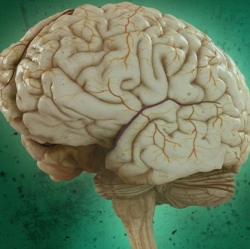
In an experiment at the Air Force Research Laboratory, Wright-Patterson Air Force Base researchers have found that transcranial direct-current stimulation (tDCS) of the brain can improve people’s multitasking skills and help avoid the drop in performance that comes with information overload.
The study was reported in a pre-publication paper in the open-access journal Frontiers of Human Neuroscience. It was motivated by the observation that various Air Force operations such as remotely piloted and manned aircraft operations require a human operator to monitor and respond to multiple events simultaneously over a long period of time. “With the monotonous nature of these tasks, the operator’s performance may decline shortly after their work shift commences,” according to the researchers.
The study set out to determine at what baud rate (difficulty level) improved multitasking throughput capacity kicks in and whether tDCS can improve performance, resulting in higher throughput capacity. The researchers used a common stimulation site for augmenting cognitive function via tDCS: the left dorsolateral prefrontal cortex (DLPFC), which has been associated with working memory, attention, vigilance, planning, and reasoning.
